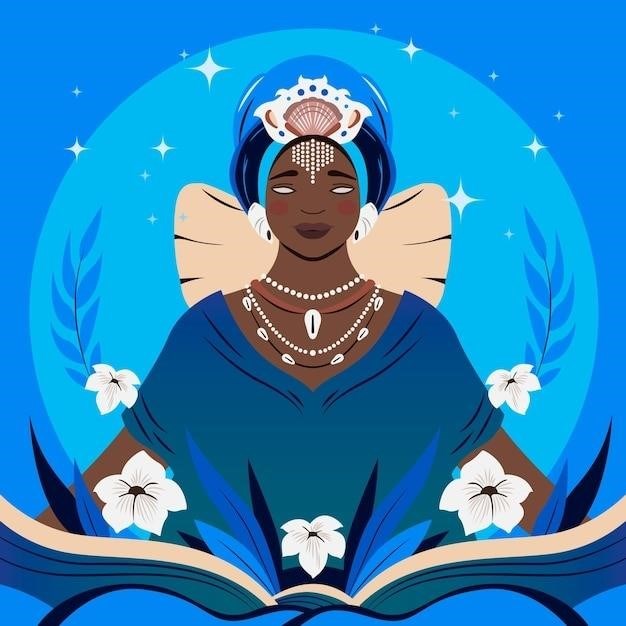
sacred woman queen afua pdf
Sacred Woman⁚ An Overview of Queen Afua’s Work
Queen Afua’s “Sacred Woman” offers a holistic approach to healing the feminine body, mind, and spirit, incorporating Afrocentric spirituality and ancient wisdom․ The book guides women on a transformative journey of self-discovery and empowerment․
Accessibility of Queen Afua’s “Sacred Woman” PDF
Accessing a PDF of Queen Afua’s “Sacred Woman” can be challenging due to copyright restrictions․ While various websites claim to offer free downloads or online reading options, these sources may be unreliable or infringe on copyright․ Legitimate access might involve purchasing the book directly from authorized retailers or through online platforms like Amazon or Barnes & Noble․ Be wary of unofficial PDFs, as they may contain malware or inaccuracies․ Remember that respecting intellectual property rights is crucial; supporting the author by purchasing the book ensures you have a legitimate copy and contributes to the creation of future works․ Always download from trusted sources to avoid potential risks to your computer security․
Online Availability and Download Options
While a direct PDF download of “Sacred Woman” isn’t officially available for free, various websites claim to offer it․ However, caution is advised․ Many sources lack legitimacy and may violate copyright laws․ Downloading from untrusted websites poses significant risks, including malware infection․ Reputable online booksellers, like Amazon Kindle and others, provide authorized digital versions of the book for purchase․ These official channels guarantee a secure, legal, and accurate copy of the text․ Consider utilizing legitimate online bookstores or libraries offering digital access to avoid potential legal repercussions and protect your devices from harm․ Always verify the source’s reliability before initiating any download․
Copyright and Legal Considerations Regarding PDF Access
Downloading or sharing copyrighted material without authorization is illegal․ Queen Afua holds the copyright to “Sacred Woman,” and unauthorized distribution infringes on her intellectual property rights․ Downloading from unofficial sources not only supports copyright infringement but also exposes users to potential malware and viruses․ Respecting copyright protects authors and ensures ethical access to creative works․ Purchasing the book legally supports the author and guarantees access to the complete, unaltered version․ Remember that illegal downloads can result in legal penalties, including fines and lawsuits․ Choose ethical and legal avenues for acquiring the book to support the author and avoid legal repercussions․
Queen Afua’s Background and Expertise
Queen Afua is a renowned herbalist, holistic health expert, and wellness coach with extensive experience in Afrocentric spirituality and women’s health․
Holistic Health Approach and Afrocentric Spirituality
Queen Afua’s work is deeply rooted in a holistic approach to health and wellness, blending traditional African healing practices with modern knowledge․ Her Afrocentric spirituality emphasizes the interconnectedness of mind, body, and spirit, drawing on ancient wisdom and ancestral knowledge․ This approach views the body as a temple, sacred and deserving of reverence and care․ The healing process encompasses physical, emotional, and spiritual dimensions, recognizing the profound impact of ancestral lineage and cultural heritage on overall well-being․ This holistic perspective is central to her teachings and guides the principles in her book, “Sacred Woman,” which encourages self-discovery and empowerment through a deep connection with one’s heritage and spiritual identity․ The combination of ancient traditions and contemporary understanding creates a unique framework for healing and self-transformation․
Authorship and Other Works by Queen Afua
Beyond the widely acclaimed “Sacred Woman,” Queen Afua is a prolific author and wellness expert with a diverse body of work․ Her best-selling book, “Heal Thyself,” revolutionized the way many approached holistic health within the African American community․ A pioneer in the green foods movement, she’s also developed the Heal Thyself product line, reflecting her commitment to natural remedies and self-care․ As a holistic health practitioner and wellness coach with over forty years of experience, Queen Afua’s expertise extends to various areas, including herbalism and natural nutrition․ She’s the founder of the Sacred Woman Rites of Passage Program and CEO of the Queen Afua Wellness Institute, demonstrating her dedication to empowering women through holistic practices and spiritual growth․ Her numerous books and programs contribute significantly to the field of holistic wellness, particularly for women of African descent․

Content and Themes of “Sacred Woman”
Queen Afua’s “Sacred Woman” explores the healing of the feminine body, mind, and spirit through twelve gateways and rites of passage, fostering spiritual transformation․
Healing the Feminine Body, Mind, and Spirit
Queen Afua’s Sacred Woman delves into a comprehensive approach to feminine well-being, addressing the interconnectedness of physical, mental, and spiritual health․ The book emphasizes the importance of nurturing the body through self-care practices and recognizing the profound impact of emotional and spiritual well-being on overall health․ It encourages readers to explore their unique relationship with their bodies, promoting self-acceptance and celebrating the inherent power and wisdom of the feminine spirit․ The holistic approach presented in Sacred Woman aims to guide women towards a state of wholeness and balance, fostering self-love and empowerment․ Through various techniques, such as meditation, affirmation, and ritual, the book provides tools for healing past traumas, releasing negative energy, and cultivating inner peace․ The overarching goal is to help women reclaim their power and live fulfilling, authentic lives aligned with their true selves․
The 12 Gateways and Rites of Passage
Central to Queen Afua’s Sacred Woman is the concept of twelve gateways, representing stages of a transformative journey for women․ These gateways serve as a framework for personal growth and spiritual evolution, guiding readers through various aspects of feminine empowerment․ Each gateway symbolizes a specific challenge or opportunity for healing and self-discovery․ The process is presented as a rite of passage, mirroring ancient traditions of feminine initiation․ The book doesn’t explicitly detail each gateway, instead offering a path of self-exploration and empowerment using practices rooted in Afrocentric spirituality and ancient wisdom․ The journey encourages introspection, self-acceptance, and the cultivation of inner strength․ It emphasizes the importance of community and sisterhood in supporting women on their path to wholeness, ultimately helping them discover their unique power and purpose․
Spiritual Initiation and Transformation
Queen Afua’s Sacred Woman presents a profound journey of spiritual initiation and transformation for women․ The book emphasizes the importance of connecting with one’s inner self and ancestral heritage, fostering a deep sense of self-awareness and spiritual awakening․ Through practices such as meditation, affirmations, and rituals, readers are guided towards reclaiming their inherent power and embracing their authentic selves․ The program encourages a shift in perspective, moving from a place of limitation to one of empowerment․ This inner transformation extends beyond personal growth, encouraging women to become agents of positive change in their communities and the world․ The Afrocentric spiritual lens provides a unique framework for understanding and celebrating the feminine spirit, offering a path to healing and wholeness that resonates with women of African descent and beyond․ The process is designed to be empowering and transformative, fostering a profound connection to the divine feminine․

The “Sacred Woman” Program and Community
Queen Afua’s Sacred Woman extends beyond the book, offering virtual retreats, workshops, and a global online community fostering connection and shared healing journeys․
Virtual Retreats and Global Sacred Woman Village
Queen Afua’s Sacred Woman program offers immersive virtual retreats designed to deepen participants’ understanding and practice of the teachings․ These retreats provide a supportive environment for women to connect with like-minded individuals, engage in guided meditations and rituals, and receive direct instruction from Queen Afua or her certified facilitators․ The Global Sacred Woman Village serves as an online community, extending the retreat experience beyond scheduled events․ This online space allows for ongoing connection, sharing, and support among participants․ It’s a vibrant hub for discussion, resources, and continued learning, fostering a sense of sisterhood and collective growth․ The virtual retreats and the Global Sacred Woman Village offer accessible pathways for women worldwide to participate in this transformative program, regardless of geographical limitations․ This blend of online and community-based engagement reflects Queen Afua’s commitment to creating a supportive and inclusive space for women’s healing and empowerment․
Workshops, Masterclasses, and Community Engagement
Beyond the virtual retreats and online village, Queen Afua’s Sacred Woman program extends its reach through a variety of workshops and masterclasses․ These in-person and online events offer focused instruction on specific aspects of the Sacred Woman teachings, providing deeper dives into particular practices or principles․ These workshops may cover topics such as herbal remedies, womb wellness, ancestral healing, or specific rituals detailed in the book․ Masterclasses often feature guest experts alongside Queen Afua, broadening the scope of knowledge and offering diverse perspectives on feminine well-being․ Community engagement is a vital component, extending the program’s impact beyond individual participation․ Queen Afua actively participates in events and collaborations that promote women’s health, empowerment, and spiritual growth within the wider community․ This commitment to community engagement underscores the program’s holistic approach, emphasizing the interconnectedness of individual well-being and collective transformation․